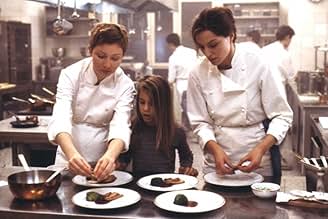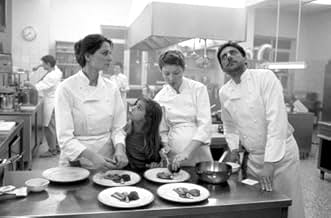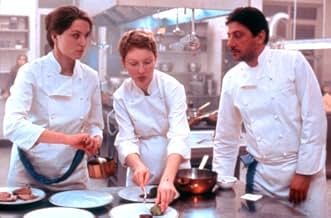CALIFICACIÓN DE IMDb
7.2/10
8.8 k
TU CALIFICACIÓN
Agrega una trama en tu idiomaWhen a headstrong chef takes charge of her equally stubborn 8-year-old niece, the tensions between them mount... until an Italian sous-chef arrives to lighten the mood.When a headstrong chef takes charge of her equally stubborn 8-year-old niece, the tensions between them mount... until an Italian sous-chef arrives to lighten the mood.When a headstrong chef takes charge of her equally stubborn 8-year-old niece, the tensions between them mount... until an Italian sous-chef arrives to lighten the mood.
- Dirección
- Guionista
- Elenco
- Premios
- 14 premios ganados y 7 nominaciones en total
Wolf-Dietrich Sprenger
- Lauter Gast
- (as W.D. Sprenger)
Victoria Trauttmansdorff
- Begleiterin
- (as Victoria von Trautmannsdorf)
Jerome Ducornau
- Jean
- (as Jerome Ducournau)
- Dirección
- Guionista
- Todo el elenco y el equipo
- Producción, taquilla y más en IMDbPro
Opiniones destacadas
(spoiler regarding the general plot)
Bella Martha reminds me of About A Boy, the "no man is an island" aspect of it. In some ways, Martha is like the guy played by Hugh Grant. The difference though is that while he apparently is really happy about the state of affairs, i.e. the isolation, she is not (even if she may not be fully aware of her own unhappiness). She has to visit a therapist regularly, although she claims that this is purely on instruction of her boss. I call this visit the first of the four "relationships" just to make the number sound more interesting.
The other three relationship all start to develop quite early in the film. First, a neighbour moves in, a gentlemanly engineer called Sam. Then in her "office" i.e. the kitchen of a restaurant where she is the chef, a chap called Mario is brought in by her boss as temporary relief for her assistant on maternity leave. Finally, death of her single-parent sister in an accident left her taking care of her eight-year-old niece Lina while they search her father in Italy.
The first half of the film developed these three relationships along the two fronts: home and office. Soon, it is clear that Sam's role is not really significant, serving just as a dependable friend and emergency-baby-sitter. On the other hand, rocky starts of the other two relationships smooth out as the two fronts merge. Lina comes to the restaurant kitchen in the evenings, becoming a darling there, while Mario becomes a family friend and Lina's buddy, and the three look just like a family. We begin to see smiles on Martha's face.
As in similar movies, just after the mid-point, when characters are well developed and things go nicely, conflicts occur. What I found is that the hostility of Lina towards Martha is less than convincing, even if we take into account her possible rejection of Martha as a mother-substitution. The eventual reconciliation also comes a little too easily. The other conflicts, on which I won't go into details, are not that well developed.
But that is exactly the main point. This is not a Hollywood movie with the standard formula of powerful dramatic conflicts and climatic tear-jerking conclusions. This point is well made when we see the ending of the story given to us quite casually as part of the credit roll. Oh yes, there's a concluding scene with the therapist, reminding us of the sense of humour that comes as part of the film.
Smooth jazz (not sure if that's the right terminology) has been used throughout the film, at the right times, enhancing it rather than distracting from it.
Finally, I really love the scenes in the kitchen which is Martha's entire universe at the beginning of the film, as well as where her reconciliation with both Mario and Lina first takes place. The story aside, I really enjoy the operation in the kitchen, which is the exact opposite to the mass production lines brought about by the industrial revolution. Here, in Martha's kitchen, things are done with what I can only describe as artistic flair.
Bella Martha reminds me of About A Boy, the "no man is an island" aspect of it. In some ways, Martha is like the guy played by Hugh Grant. The difference though is that while he apparently is really happy about the state of affairs, i.e. the isolation, she is not (even if she may not be fully aware of her own unhappiness). She has to visit a therapist regularly, although she claims that this is purely on instruction of her boss. I call this visit the first of the four "relationships" just to make the number sound more interesting.
The other three relationship all start to develop quite early in the film. First, a neighbour moves in, a gentlemanly engineer called Sam. Then in her "office" i.e. the kitchen of a restaurant where she is the chef, a chap called Mario is brought in by her boss as temporary relief for her assistant on maternity leave. Finally, death of her single-parent sister in an accident left her taking care of her eight-year-old niece Lina while they search her father in Italy.
The first half of the film developed these three relationships along the two fronts: home and office. Soon, it is clear that Sam's role is not really significant, serving just as a dependable friend and emergency-baby-sitter. On the other hand, rocky starts of the other two relationships smooth out as the two fronts merge. Lina comes to the restaurant kitchen in the evenings, becoming a darling there, while Mario becomes a family friend and Lina's buddy, and the three look just like a family. We begin to see smiles on Martha's face.
As in similar movies, just after the mid-point, when characters are well developed and things go nicely, conflicts occur. What I found is that the hostility of Lina towards Martha is less than convincing, even if we take into account her possible rejection of Martha as a mother-substitution. The eventual reconciliation also comes a little too easily. The other conflicts, on which I won't go into details, are not that well developed.
But that is exactly the main point. This is not a Hollywood movie with the standard formula of powerful dramatic conflicts and climatic tear-jerking conclusions. This point is well made when we see the ending of the story given to us quite casually as part of the credit roll. Oh yes, there's a concluding scene with the therapist, reminding us of the sense of humour that comes as part of the film.
Smooth jazz (not sure if that's the right terminology) has been used throughout the film, at the right times, enhancing it rather than distracting from it.
Finally, I really love the scenes in the kitchen which is Martha's entire universe at the beginning of the film, as well as where her reconciliation with both Mario and Lina first takes place. The story aside, I really enjoy the operation in the kitchen, which is the exact opposite to the mass production lines brought about by the industrial revolution. Here, in Martha's kitchen, things are done with what I can only describe as artistic flair.
It's almost as if Nettelbeck had been given a recipe for a perfect film - start with the tried-and-tested, take a character living alone, set in his/her ways then saddle him/her with a young kid and simmer the love-hate on a low flame; add a culture clash and vamp til ready -and discarded it in favor of her own ingredients. The culinery metaphor is self-explanatory but it IS fun to see the heavy, lard-based German cuisine slugging it out with the lighter, oil-based Italian style. Up front we have two cold teutonic hearts, aunt and neice and with the introduction of the Italian extrovert chef we know it is only a matter of time til the warm Italian sun thaws the cold aryan hearts. That's pretty much what happens but it is a DELIGHT to go along for the ride and surrender your emotional taste-buds to Nettelbeck's expertise for the entire running time. I've just seen this movie for the second time in about 8 months and I was just as captivated this time around. 9/10
A few rhetorical questions:
a. Why are there no great English-language food/romance movies? Whenever you see a movie that truly ravishes you with food preparation and recipes as part of the atmosphere of the movie, it comes from France or Mexico or Hong Kong - or, if it is in English, it's borrowed culturally from another country (e.g. Chocolat, or the Mexican-American adaptation of Ang Lee's Eat Drink Man Woman). I think it's because the English speaking societies of the world have a relatively unsophisticated approach to food preparation and dining, manifest in our great contributions to world culinary arts - fast food and industrial agriculture, plus cooking technologies that take art out of the equation. You can't have a sexy drama set amidst a world of force-fed veal or microwave dinners.
b. Why do we never talk about German comedy? The Germans do have a comedic tradition, but the movies that are released in the US tend to be solemn dramas, violent or shocking action pieces or grim experimental works. On the rare instances that I see a German comedy, I'm always pleasantly surprised, and I have the feeling I'm missing out.
c. Why are European movies so much better than American films at showing sexiness and desirability in 30- or 40-something year-old women? I have a pet theory, that European sensibilities about marriage and commitment are sufficiently different from American norms that there is the expectation that a 35-year old woman may yet be actively and happily single, or perhaps a single mom who isn't stigmatized to feel that she had best find some sucker to marry her and get out of the dating pool.
d. Why isn't jazz used in American soundtracks anymore? In this film set in Germany, the score is assembled by Manfred Eicher (founder of ECM, the acclaimed modern-jazz label), and it's all good. Some nice German lieder, classic vocal jazz, and instrumental pieces by Keith Jarrett and others. We Americans appear to have forgotten jazz as soundtrack music.
In any case, Mostly Martha is a fine little movie set in contemporary Köln, starring Martina Gedeck as the title character. Martha is a neurotic, workaholic chef at a high-end restaurant, whose control freak tendencies keep her at a distance from everyone. When her boss insists that she go to therapy, she replies by preparing recipes for the hapless shrink. Both lonely and a loner (a tricky combination), she throws herself into her work to the point of exhaustion.
Martha's single-minded life is thrown upside down when she suddenly becomes the guardian to her niece Lina (Maxime Foerste). As she struggles to take on this new role, the arrival of a competitor in the form of a brash Italian chef (Sergio Castellitto) threatens her supremacy in the kitchen.
Any viewer of romantic comedies knows where this is going, but I have no complaints about the plot line. The performances were all good; the dialogue is thoughtful; the food looks delicious. It's not a great movie, but it's a good one and would be an admirable effort by any studio.
a. Why are there no great English-language food/romance movies? Whenever you see a movie that truly ravishes you with food preparation and recipes as part of the atmosphere of the movie, it comes from France or Mexico or Hong Kong - or, if it is in English, it's borrowed culturally from another country (e.g. Chocolat, or the Mexican-American adaptation of Ang Lee's Eat Drink Man Woman). I think it's because the English speaking societies of the world have a relatively unsophisticated approach to food preparation and dining, manifest in our great contributions to world culinary arts - fast food and industrial agriculture, plus cooking technologies that take art out of the equation. You can't have a sexy drama set amidst a world of force-fed veal or microwave dinners.
b. Why do we never talk about German comedy? The Germans do have a comedic tradition, but the movies that are released in the US tend to be solemn dramas, violent or shocking action pieces or grim experimental works. On the rare instances that I see a German comedy, I'm always pleasantly surprised, and I have the feeling I'm missing out.
c. Why are European movies so much better than American films at showing sexiness and desirability in 30- or 40-something year-old women? I have a pet theory, that European sensibilities about marriage and commitment are sufficiently different from American norms that there is the expectation that a 35-year old woman may yet be actively and happily single, or perhaps a single mom who isn't stigmatized to feel that she had best find some sucker to marry her and get out of the dating pool.
d. Why isn't jazz used in American soundtracks anymore? In this film set in Germany, the score is assembled by Manfred Eicher (founder of ECM, the acclaimed modern-jazz label), and it's all good. Some nice German lieder, classic vocal jazz, and instrumental pieces by Keith Jarrett and others. We Americans appear to have forgotten jazz as soundtrack music.
In any case, Mostly Martha is a fine little movie set in contemporary Köln, starring Martina Gedeck as the title character. Martha is a neurotic, workaholic chef at a high-end restaurant, whose control freak tendencies keep her at a distance from everyone. When her boss insists that she go to therapy, she replies by preparing recipes for the hapless shrink. Both lonely and a loner (a tricky combination), she throws herself into her work to the point of exhaustion.
Martha's single-minded life is thrown upside down when she suddenly becomes the guardian to her niece Lina (Maxime Foerste). As she struggles to take on this new role, the arrival of a competitor in the form of a brash Italian chef (Sergio Castellitto) threatens her supremacy in the kitchen.
Any viewer of romantic comedies knows where this is going, but I have no complaints about the plot line. The performances were all good; the dialogue is thoughtful; the food looks delicious. It's not a great movie, but it's a good one and would be an admirable effort by any studio.
You have it now. Buy, don't rent this film. It's a keeper. Most notable and with great kudos to the director, the films stays true to itself almost all the way through. Far enough to beat out most other films. There are a few quibbles toward the end of the film, but not enough to shake off the aura it imparts just giving yourself over to its story.
The camera moves efficiently and cleanly throughout the film, and the actors respond with clean understated action and dialog.
The story is spare, and I found what I think is a clue to the writer's intention, as the protagonist describes the menu purpose of "Fish in Butter and Basil sauce." Listen for it and see if you don't agree, she is speaking to us about her story/film.
To own this is, like Nurse Betty, to own something you just have to pull out and watch a couple of times a year. just because they're so darn good.
No wonder the folks in H'wood are busy at making an American version for 2007.
The camera moves efficiently and cleanly throughout the film, and the actors respond with clean understated action and dialog.
The story is spare, and I found what I think is a clue to the writer's intention, as the protagonist describes the menu purpose of "Fish in Butter and Basil sauce." Listen for it and see if you don't agree, she is speaking to us about her story/film.
To own this is, like Nurse Betty, to own something you just have to pull out and watch a couple of times a year. just because they're so darn good.
No wonder the folks in H'wood are busy at making an American version for 2007.
The charms outweigh the clichés in "Mostly Martha (Bella Martha)." Of course it's right away different in that the phrase "German romantic comedy" isn't common and can be applied here.
I loved that "Martha" herself is a competent, self-possessed professional and that's what attracts the guy to her. While we first meet her in therapy, her problems are those of work and personal life I could certainly relate to.
While this will remind others of food prep movies like "Wedding Banquet," "Eat, Drink, Man, Woman," and "Tortilla Soup" or restaurant movies like "Dinner Rush" and "Big Night," (which all had male chefs), or "Babette's Feast," I have zero interest in cooking so cared only that "Martha" is very good at her job and at managing the restaurant kitchen.
The restaurant characters seem like real co-workers, and amazingly the niece is not some adorable child actor but seems like a real kid whose surliness is legit.
The Italian sous chef who comes on board brings the sensuality of the Mediterranean --in music (with a generous use of Paolo Conte songs), movement and language much like in the Danish "Italian for Beginners."
And of course in romance, which is still delightful even as the clichés start appearing, her happiness is indicated by her loosened hair like Jane Fonda's in "Electric Horseman."
But I enjoyed the build-up to their relationship in ever longer, longing glances and their mutual professional respect and concluding compromises.
(originally written 9/2/2002)
I loved that "Martha" herself is a competent, self-possessed professional and that's what attracts the guy to her. While we first meet her in therapy, her problems are those of work and personal life I could certainly relate to.
While this will remind others of food prep movies like "Wedding Banquet," "Eat, Drink, Man, Woman," and "Tortilla Soup" or restaurant movies like "Dinner Rush" and "Big Night," (which all had male chefs), or "Babette's Feast," I have zero interest in cooking so cared only that "Martha" is very good at her job and at managing the restaurant kitchen.
The restaurant characters seem like real co-workers, and amazingly the niece is not some adorable child actor but seems like a real kid whose surliness is legit.
The Italian sous chef who comes on board brings the sensuality of the Mediterranean --in music (with a generous use of Paolo Conte songs), movement and language much like in the Danish "Italian for Beginners."
And of course in romance, which is still delightful even as the clichés start appearing, her happiness is indicated by her loosened hair like Jane Fonda's in "Electric Horseman."
But I enjoyed the build-up to their relationship in ever longer, longing glances and their mutual professional respect and concluding compromises.
(originally written 9/2/2002)
¿Sabías que…?
- TriviaSergio Castellitto's German wasn't good enough so Frank Glaubrecht was brought in to dub his voice for the German version.
- ErroresWhen Mario and Lina get ready to cook dinner at Martha's apartment, Lina puts on her apron twice.
- ConexionesFeatured in Le cinéma passe à table (2005)
- Bandas sonorasCountry
Written by Keith Jarrett
Performed by Keith Jarrett, Jan Garbarek, Palle Danielsson, Jørn Christensen
ECM Records
Selecciones populares
Inicia sesión para calificar y agrega a la lista de videos para obtener recomendaciones personalizadas
- How long is Mostly Martha?Con tecnología de Alexa
Detalles
Taquilla
- Total en EE. UU. y Canadá
- USD 4,160,475
- Fin de semana de estreno en EE. UU. y Canadá
- USD 40,446
- 18 ago 2002
- Total a nivel mundial
- USD 9,852,022
- Tiempo de ejecución
- 1h 49min(109 min)
- Color
- Mezcla de sonido
- Relación de aspecto
- 1.85 : 1
Contribuir a esta página
Sugiere una edición o agrega el contenido que falta

![Ver Trailer [OV]](https://m.media-amazon.com/images/M/MV5BYmI4MTFiNjAtNzg5ZC00Mjg2LWFhNDYtMTVhYjYyMTM3ZGM5XkEyXkFqcGdeQXRyYW5zY29kZS13b3JrZmxvdw@@._V1_QL75_UX500_CR0)



























